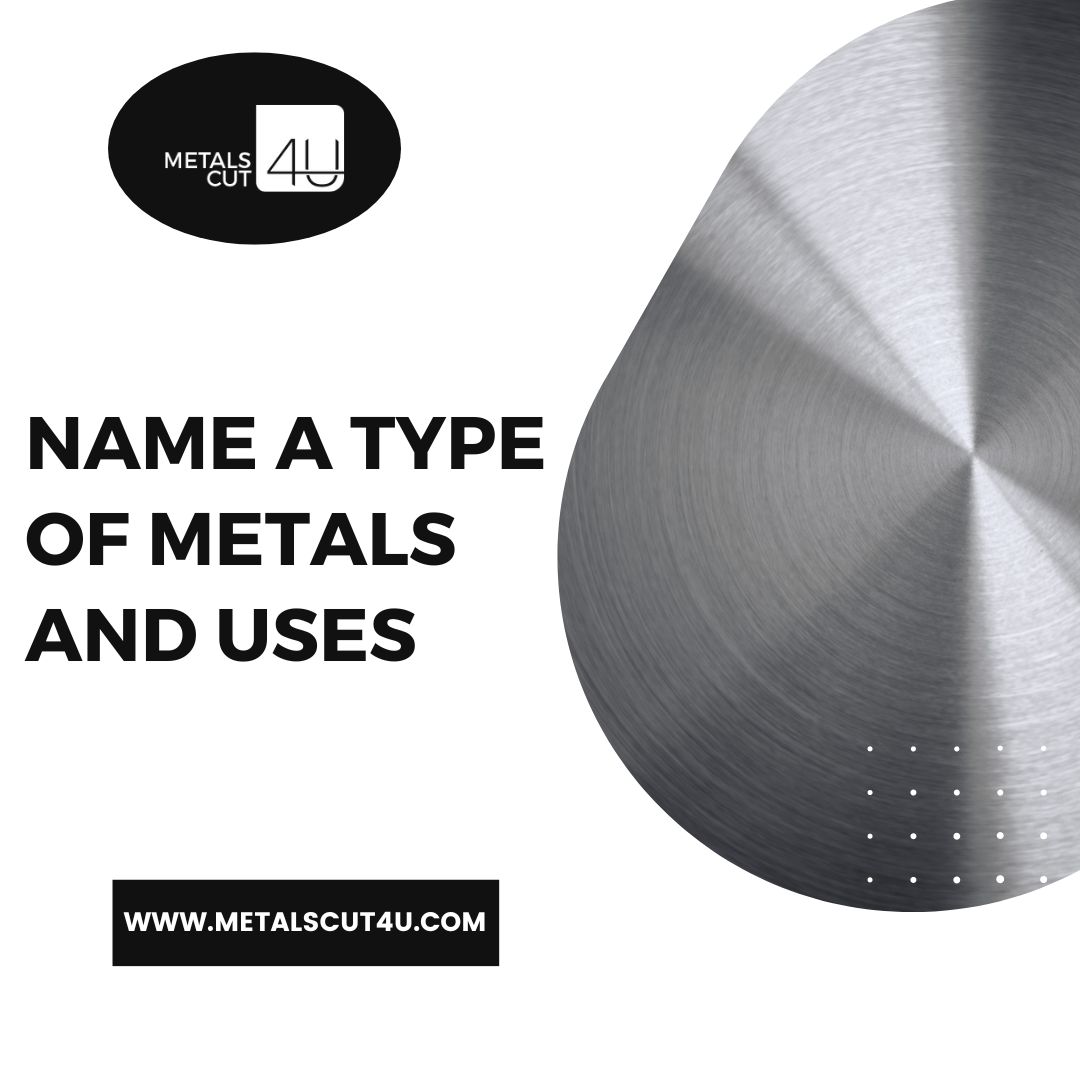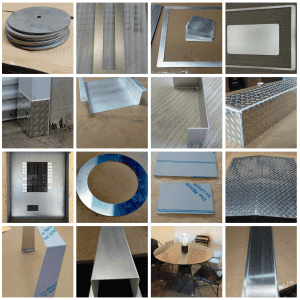Name A Type Of Metals And Uses

Metals are solid materials renowned for their exceptional properties that can be utilized in various industries and everyday applications. Most metal types possess a unique combination of strength, ductility, and electrical and thermal conductivity, making them excellent and indispensable choices in the construction, manufacturing, transportation, and electronics industries.
But What is a Type of Metal?
Popularly, types of metals are categorized into there categories such as ferrous, non-ferrous, and precious metals. Ferrous metals exemplify greater strength and durability, having iron in their compositions. Ferrous metals are extensively used in infrastructure projects, machinery fabrication, and automotive manufacturing projects. Non-ferrous metals are non-iron-based materials found on the earth as chemical compounds. And lastly, precious metals hold an esteemed position due to their scarcity and desirable properties such as gold, silver, and platinum. Any metal category combined with other categories is considered an Alloy.
Each metal category is further categorized into grades depending on the unique structure, properties, and usage of each metal. To help to get detailed information and understanding about different types of metal, we have made a list of some of the most popular and extensively used types of metal. Here is an interesting and detailed list of types of metal to help you find the best material for your construction or manufacturing projects.
Top 14 Different Types of Metal And Uses
1. Steel
Steel, undoubtedly, is one of the most used and preferred types of metal on the list. It is the combination/alloy of iron and carbon elements, making it the world’s most significant engineering and construction material. Steel is known for its exhibiting exceptional strength and durability that can be used for various construction, engineering, electrical, and manufacturing purposes. Steel when mixed with other alloys or metals, provides enhanced tensile strengths and can endure heavy loads and shock.
2. Carbon steel
Carbon steel is an alloy with carbon elements from 0.05 to 2.1 percent. The presence of carbon with steel elements offers enhanced hardness and tensile strength, allowing the alloy to withstand substantial load and resist deformation. Carbon steel is an ideal choice for structural applications where strength, durability, and machinability are paramount. Additionally, carbon steel also exhibits good thermal conductivity, efficiently transferring heat across the metal structure or project.
3. Stainless steel
Compared to other steel compositions, stainless steel simply stands out from the rest. Stainless steel is an alloy of iron, chromium, and other elements. This glossy appearance steel alloy offers excellent corrosion and rust resistance to prevent early wear and tear of the metal. To make the metal more sturdy and improve its composition, you can combine it with other elements. Stainless steel is a primary element for making kitchen utensils, knives, tables, and more. Read our blog Different Types of Steel, to learn more properties of unique steel alloys or types.
4. Wrought iron
Wrought iron is a soft, ductile, and low-carbon iron renowned for its strength, malleability, corrosion resistance, and appealing appearance. Although the metal is not as strong as steel and other steel alloys, the metal can easily withstand mechanical stress and exhibit exceptional toughness. Wrought iron can effortlessly transform into different shapes, sizes, and patterns without breaking or compromising the original texture of the structure. Wrought iron is popularly used for creating artistic sculptures, iron gates, railings, and other related purposes.
5. Aluminum
Aluminum is a lightweight and versatile type of metal that possesses a diverse range of properties. Aluminum offers a remarkable combination of strength, low density, thermal conductivity, and resistance to corrosion and rusting. Aluminum is an excellent metal option for business structures where weight reduction is crucial, such as aerospace, automotive, and other related industries. This metal can easily blend with other metal elements creating a much more durable, versatile, and flexible alloy for an array of applications.
6. Magnesium
Magnesium is another lightweight, low-density, flammable, and versatile metal used widely in fabricating different types of material for automotive, aerospace, electronics, and healthcare applications. Magnesium exhibits excellent strength, enhanced performance, and payload capacity despite the low density. To achieve the desired strength and properties, magnesium can be engineered with different types of metals with significant property values.
7. Copper
Copper is renowned for exceptional corrosion resistance, thermal conductivity, and antimicrobial properties. This metal is a fundamental material in applications ranging from electrical wiring, plumbing, and healthcare applications. The low electrical resistance properties of copper allow the efficient flow of electricity, reducing energy loss and enabling the reliable operation of electrical systems. Copper also demonstrates outstanding thermal conductivity that effectively conducts and transfers heat, making it a valuable element in applications requiring heat dissipation, including radiators, cooling systems, and heat exchangers.
8. Brass
Brass is a combination of copper and zinc, known for its high versatility, appealing appearance, exceptional machinability, corrosion resistance, and acoustic properties. Brass is extensively used in making applications such as musical instruments, plumbing, and different decorative objects. The visual allure of brass adds a necessary touch of elegance, sophistication, and aesthetic appeal to any application. The brass also exhibits outstanding machinability, allowing the structure to be easily shaped, formed, and converted into complex or different shapes. To learn more about metals that don’t rust easily, browse our website or get in touch with one of our representatives.
9. Bronze
Bronze is primarily composed of copper and tin. Such types of metal are known for offering great durability, malleability, corrosion resistance, and aesthetic appeal. The combination of copper and tin enhanced strength, hardness, and wear and tear-resistant properties to various applications or project structures. The tin in this combination allows improved resistance to environmental factors, including moisture, air, and other chemicals that can potentially compromise the original texture of the metal structure. Applications made out of bronze can be easily used for a variety of outdoor applications.
10. Zinc
Zinc is a non-ferrous metal with a distinct array of properties that offer valuable properties in numerous industrial applications. Zinc is popularly known for its corrosion resistance, malleability, low melting point, and versatile chemical reactivity used in a wide array of applications ranging from galvanizing metal objectives alloy production, and creating different applications. Zinc metal can be easily shaped in different structures, forms and rolled into thin sheets as per the needs and requirements of your business or personal project.
11. Titanium
Titanium is a lustrous and strong metal with remarkable properties such as exceptional strength-to-weight ratio, corrosion resistance, biocompatibility, and high melting point. Titanium is a popular metal used in aerospace applications and sporting equipment. The lightweight nature of titanium allows improved fuel efficiency, load-bearing capacity, and overall performance. Titanium’s inherent corrosion resistance properties allow the metal to form a thin and tenacious oxide layer on its surface when exposed to oxygen, protecting the application from the most corrosive environments.
12. Tungsten
Tungsten is a hard and dense metal that is used in a wide array of applications. Tungsten is known for offering impressive conductivity, outstanding strength, high melting point, and resistance to wear and tear. Tungsten is a popular material in aerospace, electrical engineering, mining, and manufacturing industries. It's the strongest metal on the earth. It holds the highest tensile strength among all metals, making it an extremely robust and durable metal on the list.
13. Nickel
Nickel is a silvery-white metal known for its high tensile strength and durability and ability to maintain its mechanical properties at high and low temperatures, making it suitable for fabricating critical applications in extreme environments. Nickel forms a protective oxide layer on its surface, which helps protect it from early oxidation and corrosion. Additionally, nickel offers excellent electrical conductivity contributing to efficient energy transfer and transmission.
14. Cobalt
Cobalt is lustrous and silvery-gray metal, which is highly valuable in various industrial applications. One of the primary properties of cobalt is its remarkable tensile strength and hardness, making it the most suitable material for use in turbine blades, high-speed cutting tools, and wear-resistance equipment that can endure extreme mechanical stresses.
What is a Metal Made Out of?
Different forms of metal are composed of metallic elements, which are atoms with unique properties such as high electrical conductivity, malleability, and luster. Metals are generally found in a solid state, consisting of unique properties contributing to the fabrication of various application structures. Most common metallic structures are iron, copper, aluminum, and titanium.
Name a Type of Metal With The Longest Name
Tunsgten-hafnium-carbide is a metal with the longest name consisting of tungsten, hafnium, and of carbon atoms. This metal alloy is known for its extreme hardness and high melting point. Another metal alloy with the longest name is a magnesium-aluminum-zinc-copper-nickel metal commonly used for its lightweight and high-strength properties.
Choosing the right metal is the most crucial aspect of metal construction or manufacturing projects. Inappropriate material use can result in huge losses and affect your business reputation. Get in touch with us to discover the best and most effective fabrication methods for different types of metal and unique business requirements. We offer metal-cutting services at affordable and relatively cheaper rates to ensure you get the desired results without compromising the quality of your project.
